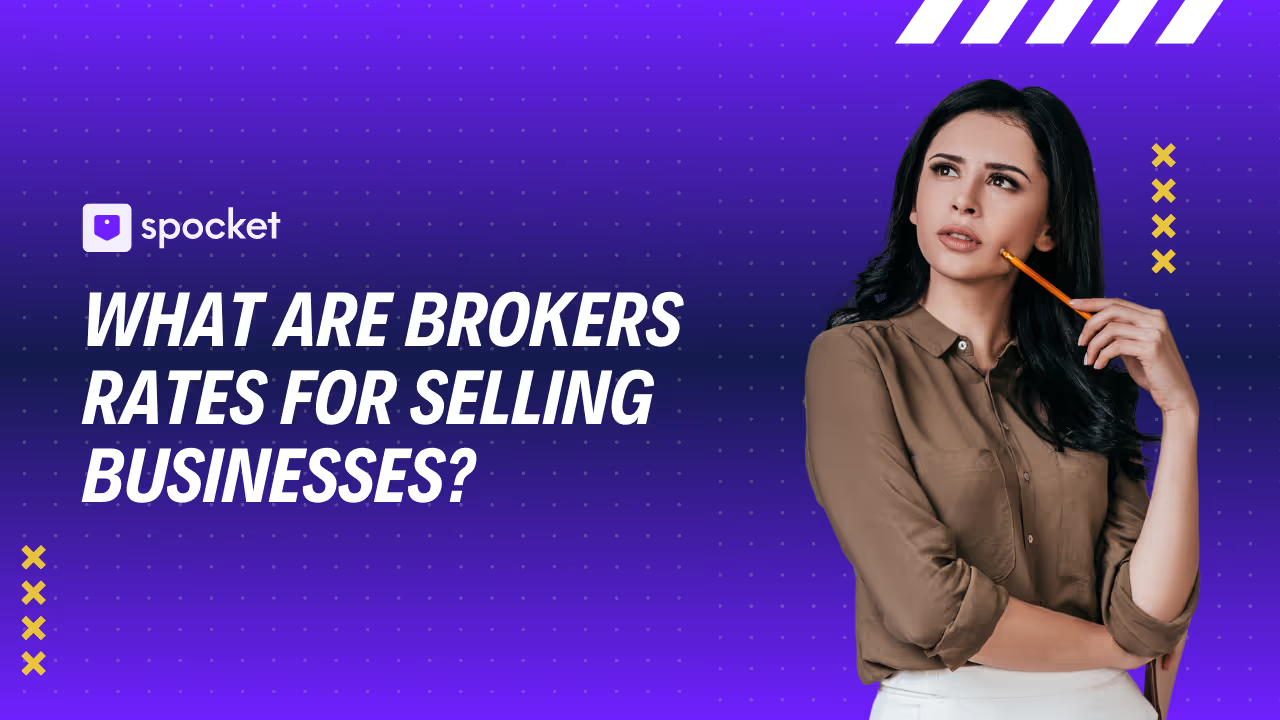If you have been in the brokerage business for over 30 years, you will realize that this model can make 80% of your income. And the top 20% don't even make that cut. So, a big part of your success is your years of experience.
The percentage commission you get will depend on the size of the business. A good rule of thumb is the modified Lehman scale, where a broker can receive 10% of the first million in sale profits, 8% of the second, and then continue scaling from there. Commissions and contract structures can differ for every broker, but it's worth noting that the most successful and highly sought funds charge more with a tiny upfront fee.
Many things influence a broker's success rate. And let's not forget the average time it takes to sell a business, which can be a minimum of 8.5 months. You also have to consider how extensive their buyer database is and what kind of competition you're dealing with. What financial resources does a broker have, and will it get you more cash in your pocket at the closing table? Do brokers work with other brokers to bring buyers in or collaborate with co? Or do they prefer to work solo?
Many unanswered questions exist, but we all have one: How much do brokers charge to sell a business? This blog will provide a breakdown of that.
How Much Does It Cost to Sell a Business?
Selling a business is not just about mediation or letting a broker take care of it. You need a lawyer to manage your business contracts and not just download templates from the internet. These contracts must be bespoke or you can land in a lot of legal trouble.
Legal and accountancy fees can be as high as £2000; for a minor deal, they can be a minimum of £50000. You may even end up paying up to £2 million or more than £20,000. It depends on the business size you want to sell, and market conditions may not always be favorable.
There is one big difference in how fees are charged across the industry. Some of the best brokers who aggressively acquire clients charge no upfront fees. They are known for their large-scale cold-calling operations and complex sales. This means they operate on a no-sale, no-fee basis. Their aggressive selling tactics work very well and operate under a success-fee-only model. The client will sign a contract, and the broker will advertise the business for sale. They are only paid a percentage of the final price if they manage to sell the company. However, you have nothing to pay if they cannot sell your business.
In theory, though, this may work in favor of the customer. However, it doesn't. Vendors must be cautious about who they enter agreements with. The rat trap is prevalent, and some minor brokers offering friendly and efficient local service tend to use this charging model.
What about Retainer Fees?
Brokers that care for larger businesses will charge higher retainer fees. They will have a business exit preparation plan and other work done, which means they've got several weeks' worth of work done, which you won't expect. Your retainer fees will be high if your business is large-scale. If your company has a turnover of £50 million, the cost will start at least a few hundred thousand pounds.
These businesses will require investment banker-grade professionals, complete with FCA registration. Not all brokers will deliver equal value for the upfront fees they charge. These fees will vary, but most are paid monthly or quarterly. There will also be VAT taxes that you have to pay on top of the prices they quote.
Melbourne Business Brokers provide valuable services, helping to buy and sell businesses. They are valuations, negotiations, and paperwork experts and ensure smooth transactions. Some brokers make good money, but most don't. Retail Brokers can make up to $5 million a year, and some can make up to $50 million a year. Average Brokers can make around $10,000 a month, which is very low.
The revenue they generate pays the bills, and most brokers can make between 29% and 35% of their commissions. Insurance and payroll taxes are also involved. The prices or earnings will vary if you add another 15% to office rent and bonds, phone bills, printing, backroom office staff, receptionists, and central office overheads.
Most brokers can keep their jobs if they make $10,000 a month in commissions. If they make less than that, they will be fired. Building a business takes about a year, but the best brokers usually take three years. The most they can make when starting is $26,000 in one month.
How Much Do Brokers Charge to Sell a Business?
Brokers can charge a fee of 10% to 20% of the total sale price. So, if your company sells for $100,000, you can expect to pay between $10,000 and $20,000 in broker fees. These fees are typically non-refundable, but they can be negotiable.
You may also have to pay more fees for additional services like consulting or market research done by them. You can manage your business sales through broker organizations like Baton. They will offer business owners a certified valuation estimate based on verified financial data. They can track your business data, chart your progress, and compare it with competitors. Baton is an online marketplace for businesses that want to sell their brands. Brands and many other organizations like Baton help you sell enterprises if you don't want to approach independent brokers. Business brokers can charge monthly retainers and receive fixed monthly fees from the business owner.
Are Broker's Fees Tax-Deductible?
In many cases, broker's fees for selling a business are considered tax-deductible, as they are categorized as a cost of doing business. However, this depends on specific tax laws in your jurisdiction. For instance, in the U.S., brokerage fees may be deducted as part of the cost basis of the sale. It’s crucial to consult a tax professional who can guide you through the tax implications of broker fees. They will help ensure compliance while maximizing tax efficiency during your business transaction.
Benefits of Using Business Brokers
Here are the benefits of using business brokers:
- Expertise and Market Knowledge: Business brokers deeply understand market trends, valuation techniques, and buyer behavior. Their expertise ensures your business is priced competitively, attracting serious buyers without undervaluing your hard work. They also understand the legal and financial intricacies of business sales, helping you avoid costly mistakes and ensuring compliance with regulations.
- Time-Saving: Selling a business is a time-intensive process involving marketing, screening potential buyers, arranging meetings, and negotiating terms. Business brokers handle these tasks, freeing you to focus on maintaining or growing your business during the sale process. They streamline communication with buyers and keep the process moving efficiently.
- Access to Qualified Buyers: Business brokers maintain extensive networks and databases of potential buyers, including individuals, corporations, and investment groups. Their ability to match your business with the right buyers increases the chances of a successful sale. They also pre-screen buyers for financial capability and seriousness, saving time and effort.
- Marketing Expertise: Professional marketing is essential to showcase your business in the best possible light. Brokers craft compelling marketing materials, including detailed business summaries, financial highlights, and growth potential analyses. They advertise in relevant marketplaces and use targeted strategies to reach suitable buyers.
- Negotiation Skills: Experienced brokers are adept at negotiating terms that satisfy buyers and sellers. They act as intermediaries, maintaining a professional tone and focusing on the deal's value rather than emotions. This is particularly beneficial during complex transactions involving multiple stakeholders.
- Maximizing Sale Value: By using their knowledge and connections, brokers often secure higher sale prices than business owners could achieve independently. Their ability to highlight the value proposition of your business and find the right buyers makes their commission a worthwhile investment.
The Role of Business Brokers in Negotiating Complex Sales Deals
Business brokers are not just intermediaries; they act as strategic advisors throughout the sales process. Their involvement is crucial in complex transactions, such as minority buyouts or earn-out agreements, often seen in middle-market deals. Brokers balance the interests of both parties, ensuring fair and mutually beneficial terms. For example, in an earn-out deal, they help establish performance benchmarks that safeguard both the seller's and buyer's interests, ensuring a smooth post-sale transition.
Handling Confidentiality and Buyer Screening
Maintaining confidentiality is a cornerstone of successful business sales. Brokers employ blind profiles to discreetly market your business without revealing identifying information. They also rigorously screen potential buyers for financial capability and alignment with your business goals, protecting your time and reputation.
Coordination of Legal and Financial Processes
From drafting agreements to navigating due diligence, brokers coordinate the legal and economic aspects of the transaction with attorneys, accountants, and financial advisors. This ensures compliance and reduces the risk of errors that could derail the deal.
Differences Between M&A Firm Fees and Business Broker Fees
M&A (mergers and acquisitions) firms primarily deal with middle-market and more significant deals, often involving businesses with valuations exceeding $10 million. Their fee structures typically include:
- Retainer Fees: Ranging from $50,000 to $200,000, these are upfront costs covering preparatory work.
- Success Fees: M&A firms use a modified Lehman formula—commonly 5% of the first million, 4% of the second million, and gradually decreasing percentages for subsequent amounts.
- Additional Costs: Marketing expenses, due diligence, and travel costs may also be invoiced separately.
Business brokers focus on lower to middle-market transactions, such as Main Street deals. Their fee structures often involve:
- Commission-Only Models: Brokers charge 10%–12% of the sale price, with no upfront costs.
- Flat Fees: Some brokers may offer fixed fees for specific services like business valuations.
- Monthly Retainers: Retainers can range from $1,500 to $10,000 for more significant transactions.
M&A firms generally justify their higher costs with a broader buyer network and complex deal management, while business brokers are ideal for more minor, straightforward sales.
Stock brokerage fees in business sales typically occur when the transaction involves equity transfers. Here's a breakdown:
- Listed Stocks: If your business involves publicly traded stock, expect brokerage fees to range from 0.1% to 0.5% of the transaction value.
- Flat vs. Hybrid Fees: Online platforms may charge a flat fee for trades, while traditional brokers often combine flat fees with percentage-based commissions.
- ETFs: For businesses with portfolios of ETFs, transaction fees may apply when assets are liquidated.
How to Reduce Brokerage Fees to Zero
While eliminating broker fees is rare, there are strategies to minimize costs:
- Negotiate Fees: Many brokers are open to adjusting their commission percentages, especially for higher-value businesses.
- DIY Sales: Selling independently saves fees but requires significant time and expertise.
- Online Platforms: Use marketplaces like Baton or BizBuySell, which charge lower fees than traditional brokers.
- Hybrid Models: Combine DIY efforts with limited broker assistance to reduce overall costs.
Conclusion
Selling a business is a complex process that requires professional guidance to maximize value. Brokers justify their fees by bringing expertise, networks, and negotiation skills. Understanding fee structures, negotiating terms, and leveraging online tools can help you make informed decisions. Whether you’re navigating a Main Street deal or a middle-market merger, the right broker can make all the difference. Do you want to build a dropshipping business to sell it later or make big profits? Start your journey with Spocket!







































